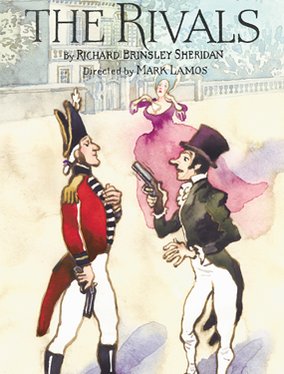Having been pleasantly surprised by how funny the first part was, the Dr Johnson Reading Circle settled once again online to perform the rest of Richard Brinsley Sheridan’s The Rivals.
Act 3, Scene 4 starts with the country squire, Bob Acres admiring his new ‘city’ look. His servant, David, declares him as a ‘Devon monkeyrony’, so spruced up is appearance that at home the cook, Mrs Pickle would cry ‘Lard preserve us’… (I think it’s a good little joke, anyway). Sir Lucius O’Trigger comes round to encourage him to challenge the mysterious Ensign Beverly to a duel, stoking his bloodlust so Bob ‘catches courage’ from him. Despite the best efforts of David, Bob is committed to the idea of duelling and sends for Captain Absolute to send the challenge and talk up his prowess as ‘Fighting Bob’. Absolute, knowing there is no Ensign Beverly is happy to take the letter.
As he’s coming out of Bob’s lodgings, he’s cornered by his father and dragged to the most awkward of meetings, where he must reveal to Lydia that he was not Beverly, but Absolute all along. He tries to put it off, relying on her looking the wrong way and trying to put on a rough voice but the damage is done and Lydia never wants to see him again. His father is not-so-secretly pleased that his son is a trickster and lover but Captain Absolute is despondent, putting him in a particularly fatalistic mood when Sir Lucius O’Trigger calls him to a duel for a perceived slight.
The rest of the play involves various characters preparing for, trying to stop, or gleefully anticipating the duels between O’Trigger, Fighting Bob and Captain Absolute. There’s a pause to catch up with Faulkland, who is still moping. He lies to Julia, saying that he needs to escape town and asking if she could join him in poverty as a fugitive. When she accepts, he reveals that it was a lie and it’s this that finally breaks their relationship - there were fist pumps of happiness for her at this moment.
When the characters all converge at the duelling spot, there’s some fun at Bob’s courage oozing from him at the thought of being buried in Bath Abbey but the jokes largely cease for the characters to quickly clear up their confusions, introspect and pair up. Lydia realises she does love Captain Absolute, even if she has to forfeit the romance of an elopement and the two reunite. Unfortunately for us, Julia and Faulkland also patch up their differences and he promises to be less of a selfish weirdo - I’m not sure I believe him. Bob is single but happy for his lucky escape and Sir Lucius finds out his epistolary paramour was actually Mrs Malaprop, who he declines, leaving her cursing men.
There’s something rushed about the second half of The Rivals. Lucy, the trickster maid, disappears completely and the other characters seem to charge ahead to the tidy dénouement, rushing scenes that could have produced more laughs. Thinking of Shakespeare’s false duel in Twelfth Night, the characters are trying to run away and being stirred up at the same time but these duelists have a polite conversation and clear everything up before they’ve even measured out the field of combat.
What’s more, the romantic pairings don’t feel like great triumphs. The relationship between Captain Absolute and Lydia Languish seems too shallow to really celebrate. A modern audience would be actively against Julia being shackled to the insufferable Faulkland and Bob and Sir Lucius are left with nobody. Also left alone is Anthony Absolute, the bluff father, who could have at least landed tricksy Lucy as a mistress, and Mrs Malaprop, who definitely deserved a happy ending for all the mean things people said about her. For a play that started so strongly, it ends a little whimperingly but it was still fun to perform and be performed to and I like forward to see what play we may try next.



No comments:
Post a Comment